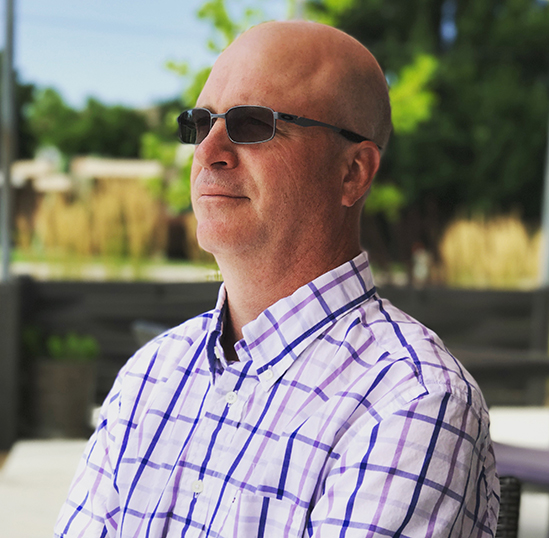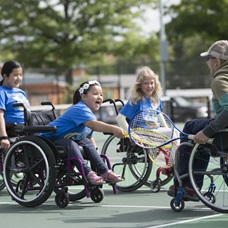Better Together
St. Luke’s CHIF helps organizations promote healthy communities in Idaho


St. Luke’s is committed to improving the health of people in the communities it serves.
One very important way that St. Luke’s carries out its mission is through the Community Health Improvement Fund (CHIF).
This year, 91 non-profit organizations across the Treasure Valley received more than $650,000 in CHIF grants. St. Luke’s will invest an additional $290,000 in Magic Valley nonprofits this year.
Roseanne Swain is the superintendent of recreation for the City of Boise. In her mind, the fund isn’t just about money.
“St. Luke’s is so present in this community through dollars and their expertise, and we just couldn’t do what we do in this community without them,” Swain said. “I love working with St. Luke’s.”
This year Swain applied for – and received – funds for four Boise Parks and Recreation programs: Boise Urban Garden School, Idaho Youth Adaptive Sports Camp, a program that buys lifejackets for children whose families cannot otherwise afford them and another that’s creating a sailing organization.
Swain said money those programs received from St. Luke’s is “invaluable.”
And she said it isn’t a stretch to say the lifejacket program will save lives.
“The lifejackets, oh my gosh, when we decided to do this, St. Luke’s stepped up. And then I applied again the next year and it was funded, and they decided to come out and provide education along with the money, just to make sure we’re putting the message out there about water safety.
“We teach the kids to go home and teach their parents, and St. Luke’s is a part of the process.”
When choosing how to distribute the grants, St. Luke’s gives special consideration to organizations whose proposals target needs identified through St. Luke’s Community Health Needs Assessment (CHNA).
The CHNA’s top three priorities are:
- To improve the prevention, detection and treatment of obesity and diabetes.
- To improve the prevention, detection and management of mental illness and reduce suicide.
- To improve access to affordable health care and affordable health insurance.

Emily Johnson is the CEO of Big Brothers Big Sisters of Southwest Idaho, another non-profit that received funds through the CHIF.
“When we work with St. Luke’s and with CHIF, we base a lot of our work on the ACEs study – kids who have had some sort of adverse childhood experience (ACE),” Johnson said. “This could affect their future as far as their rates of incarceration or ability to achieve education.”
The Big Brothers Big Sisters provides children with one-on-one support through adult volunteers.
“St. Luke’s is putting their money where their mouth is for something we think is really important,” Johnson said. “It’s always nice to have community partners that kind of understand it and think it’s important, too. We’re really proud of our partnership with CHIF and St. Luke’s.”
It’s these partnerships that fulfill St. Luke’s important mission of bettering the health of people in communities throughout Idaho.
“At the end of the day, we all want to have a good community,” Johnson said. “You want a happy, healthy place to live. We help kids who maybe have had a bit more challenging childhood so they can grow up to be happy, healthy productive adults.
“St. Luke’s is basically just changing the community for the better.”
Apply for CHIF
CHIF grants are announced and awarded in January and February each year, with special consideration given to applicants that align with needs identified through St. Luke’s Community Health Needs Assessments.
St. Luke’s begins accepting CHIF grant applications from non-profit organizations every summer. In the Treasure Valley, applications open in August and close Sept. 30. Magic Valley accepts applications starting in July, with final applications due at the end of August.
Each application is reviewed by multiple committees, expert volunteers and St. Luke’s leaders. As part of the grant award, receiving organizations must submit an ‘Activation Report’ by October 1, outlining how the grant dollars were used and where the impact was made.
Find program application forms on the Community Health Improvement Fund Grants page.2019 CHIF recipients
- Ada County Highway District
- Ada County Medical Society Foundation
- Advocates Against Family Violence
- Alzheimer’s Association: Greater Idaho Chapter
- American Cancer Society
- American Lung Association in Idaho
- Angel Wings Network, Inc.
- Assistance League of Boise
- Autism Society Treasure Valley
- Big Brothers Big Sisters of Southwest Idaho
- Boise Bicycle Project
- Boise Public Schools Education Foundation
- Boise State Dance Marathon
- Boys & Girls Club of Nampa
- Boys & Girls Clubs of Ada County
- Boys & Girls Clubs of Western Treasure Valley
- Building Villages Inc.
- Camp Rainbow Gold
- Camp River Run Inc.
- Canyon County Ambulance District
- Cascade Food Pantry
- CATCH
- Children's Home Society of Idaho
- City of Boise – Parks and Recreation Department
- City of Cascade
- City of Mountain Home Parks & Recreation
- Comprehensive Cancer Alliance for Idaho
- Create Common Good
- Destination Caldwell
- Donnelly Farmers Market
- Dravet Syndrome Foundation
- Elderly Opportunity Agency Inc.
- Expedition Inspiration Fund for Breast Cancer Research
- FA Club – Friends Always Club
- Faces of Hope Foundation
- Family Advocates
- Family Justice Center Foundation of Idaho
- Genesis Community Health Inc.
- Giraffe Laugh Early Learning Centers
- Girl Scouts of Silver Sage Council
- Girls on the Run Treasure Valley
- Hometown Dealership
- Horizons Lifestyle and Education Team
- Idaho 2 Fly Inc.
- Idaho Academy of Family Physicians
- Idaho Chapter of the National Hemophilia Foundation
- Idaho Diabetes Youth Programs
- Idaho Hunger Relief Task Force
- Idaho Immunization Coalition
- Idaho Suicide Prevention Hotline
- Idaho Voices for Children
- Idaho Zoological Society, Friends of Zoo Boise
- Jayden DeLuca Foundation
- Learning Lab Inc.
- Legacy Corps
- Let’s Move Caldwell
- Leukemia & Lymphoma Society
- Metro Community Services
- Mountain Home High School
- Mountain Home School District
- Muscular Dystrophy Association
- Nampa Housing Authority
- Nampa School District
- National MS Society, Utah-Southern Idaho Chapter
- Pancreatic Cancer Action Network
- Payette County Paramedics
- Reel Recovery
- Ride for Joy Therapeutic Riding Program
- River Discovery
- Ronald McDonald House Charities of Idaho Inc.
- Salmon River Senior Citizens
- Sleep in Heavenly Peace
- Snake River Stampede for the Cure Foundation
- Southwest District Health
- Special Olympics Idaho
- St. Michael’s Cathedral
- Surviving Hearts Cancer Support Group
- Susan G. Komen Idaho Montana
- Terry Reilly Health Services
- The Idaho Foodbank
- The Mentoring Network Inc.
- The Salvation Army, Boise
- The Salvation Army, Nampa
- Treasure Valley Believe in a Cure
- Treasure Valley Children’s Relief Nursery
- Treasure Valley Down Syndrome Association
- Treasure Valley Family YMCA
- Treasure Valley Food Coalition
- Valley Regional Transit
- Women's & Children's Alliance
About The Author

Chris Langrill is a writer and copy editor for the St. Luke’s Communications and Marketing department.


